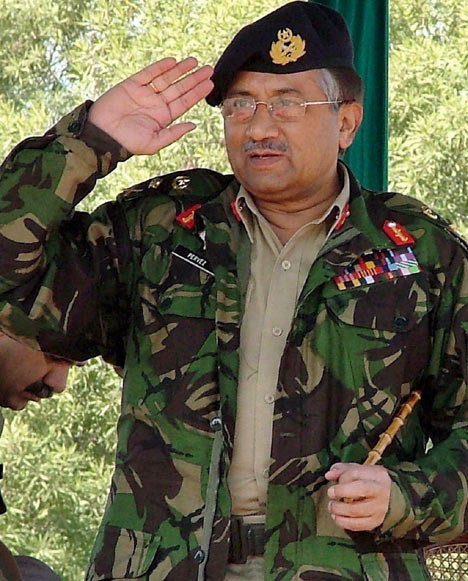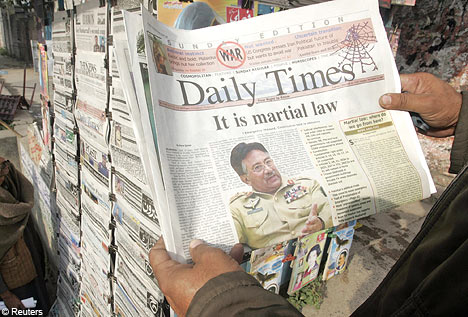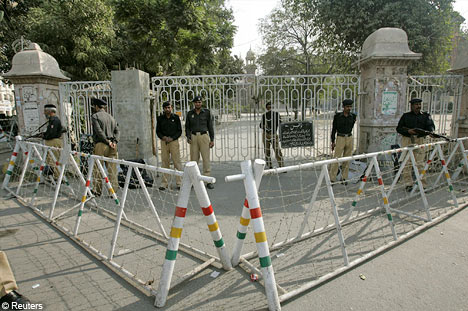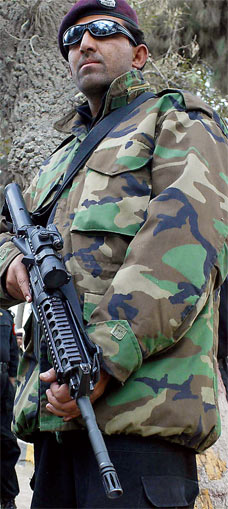BAK
JF-Expert Member
- Feb 11, 2007
- 124,790
- 288,006
'Desperate' Musharraf declares martial law
· Pakistan's president acts against rivals
· Britain expresses 'grave concern'
Declan Walsh in Islamabad
Sunday November 4, 2007
The Observer
Pakistan's president Pervez Musharraf imposed emergency rule last night, plunging the nuclear power into crisis and triggering condemnation from leaders around the world.
The action to reassert his flagging authority was, he said, a response to Islamic militancy and to the 'paralysis of government by judicial interference'. He said that his country's sovereignty was at stake.
Judges and lawyers were arrested, troops poured on to city streets and television and radio stations were taken off the air. Musharraf also suspended the constitution and fired the chief justice, Muhammad Iftikhar Chaudhry, who spearheaded a powerful mass movement against him earlier this year.
Last night police arrested opposition politicians and senior lawyers including the chief justice's lawyer, Aitzaz Ahsan, and Imran Khan. 'Musharraf is acting like a spoiled child, holding the whole country hostage. These are the last days of Pervez Musharraf,' said Ahsan as he was escorted from his home into a police van. Ahsan, who leads the Supreme Court Bar Association, said that lawyers would launch a series of nationwide protests tomorrow.
Soldiers entered the Supreme Court in the late afternoon where Chaudhry and six other judges said Musharraf's declaration that he would rule under a provisional constitutional order was illegal. Chaudhry was reportedly under house arrest last night.
Police sealed off the main street in central Islamabad and soldiers entered the state television and radio buildings. Private news networks went off the air and mobile phone coverage was intermittent. Shots were heard in several neighbourhoods of Karachi, where there is strong support for former Prime Minister and opposition leader Benazir Bhutto, who had gone to Dubai on Thursday on a personal visit. She arrived back in Pakistan to a rapturous welcome last night and immediately decried Musharraf's move as tantamount to dictatorship.
'Unless General Musharraf reverses the course, it will be very difficult to have fair elections,' she said.
The United States, which sees Musharraf as a crucial ally against al-Qaeda, had urged him to avoid taking authoritarian measures and called the move 'very disappointing'.
Late last night Musharraf addressed the nation on state television. He said he decided to impose a state of emergency in response to a rise in extremism and to interference from the courts and judges in the business of government. Pakistan's internal security has deteriorated in recent months with a wave of suicide attacks by al-Qaeda-inspired militants, including one that killed 139 people.
There had been increasing speculation that Musharraf, who seized power in a 1999 coup, might declare an emergency rather than run the risk the Supreme Court would rule against his re-election as president. US Secretary of State Condoleezza Rice said she was 'deeply dismayed' by the move and Whitehall expressed 'grave concern'.
In a statement last night, the Pentagon said the emergency declaration by Musharraf did not impact the US military support of Pakistan or its efforts in the war on terror. Spokesman Geoff Morrell said: 'Pakistan is a very important ally in the war on terror and he [US Defence Secretary Robert Gates] is monitoring the situation there.'
Britons of Pakistani origin were also urged to use their contacts to press home the message by the Foreign Secretary, David Miliband. 'All friends of Pakistan will be concerned by the turn of events today,' he said. 'We recognise the threat to peace and security faced by the country, but its future rests on harnessing the power of democracy and the rule of law.'
Musharraf had promised to resign as army chief by 15 November, with general elections due by mid-January. Those elections are now in doubt, as is a power-sharing deal with Bhutto. 'She is waiting to see if she is going to be arrested or deported,' Wajid Hasan, her spokesman, said.
Musharraf has faced numerous crises over the past year, including protests, court challenges and spiralling Islamist violence. Last week troops mounted a major assault on an Islamist cleric who has declared his own Islamic mini-state in Swat, a previously peaceful area popular with tourists.
But the greatest threat to Musharraf's power was the Supreme Court, which was due to rule in the coming weeks on the legality of his controversial 8 October re-election as president. As the result of an opposition boycott, he received 98 per cent of the votes. The legal challenge has now been quashed, but emergency rule raises a range of new problems including the possibility of widespread public protest and a further breakdown of Pakistan's battered state institutions.
Hardliners in Musharraf's political party, PML-Q have been urging him to impose emergency rule for months. But others have opposed yesterday's move. One senior PML-Q official, who declined to be named, told The Observer that the move was a disaster and predicted it would eventually spell 'the end for Musharraf'.
Human Rights Watch condemned yesterday's move as 'a brazen attempt at muzzling the judiciary'.
· Pakistan's president acts against rivals
· Britain expresses 'grave concern'
Declan Walsh in Islamabad
Sunday November 4, 2007
The Observer
Pakistan's president Pervez Musharraf imposed emergency rule last night, plunging the nuclear power into crisis and triggering condemnation from leaders around the world.
The action to reassert his flagging authority was, he said, a response to Islamic militancy and to the 'paralysis of government by judicial interference'. He said that his country's sovereignty was at stake.
Judges and lawyers were arrested, troops poured on to city streets and television and radio stations were taken off the air. Musharraf also suspended the constitution and fired the chief justice, Muhammad Iftikhar Chaudhry, who spearheaded a powerful mass movement against him earlier this year.
Last night police arrested opposition politicians and senior lawyers including the chief justice's lawyer, Aitzaz Ahsan, and Imran Khan. 'Musharraf is acting like a spoiled child, holding the whole country hostage. These are the last days of Pervez Musharraf,' said Ahsan as he was escorted from his home into a police van. Ahsan, who leads the Supreme Court Bar Association, said that lawyers would launch a series of nationwide protests tomorrow.
Soldiers entered the Supreme Court in the late afternoon where Chaudhry and six other judges said Musharraf's declaration that he would rule under a provisional constitutional order was illegal. Chaudhry was reportedly under house arrest last night.
Police sealed off the main street in central Islamabad and soldiers entered the state television and radio buildings. Private news networks went off the air and mobile phone coverage was intermittent. Shots were heard in several neighbourhoods of Karachi, where there is strong support for former Prime Minister and opposition leader Benazir Bhutto, who had gone to Dubai on Thursday on a personal visit. She arrived back in Pakistan to a rapturous welcome last night and immediately decried Musharraf's move as tantamount to dictatorship.
'Unless General Musharraf reverses the course, it will be very difficult to have fair elections,' she said.
The United States, which sees Musharraf as a crucial ally against al-Qaeda, had urged him to avoid taking authoritarian measures and called the move 'very disappointing'.
Late last night Musharraf addressed the nation on state television. He said he decided to impose a state of emergency in response to a rise in extremism and to interference from the courts and judges in the business of government. Pakistan's internal security has deteriorated in recent months with a wave of suicide attacks by al-Qaeda-inspired militants, including one that killed 139 people.
There had been increasing speculation that Musharraf, who seized power in a 1999 coup, might declare an emergency rather than run the risk the Supreme Court would rule against his re-election as president. US Secretary of State Condoleezza Rice said she was 'deeply dismayed' by the move and Whitehall expressed 'grave concern'.
In a statement last night, the Pentagon said the emergency declaration by Musharraf did not impact the US military support of Pakistan or its efforts in the war on terror. Spokesman Geoff Morrell said: 'Pakistan is a very important ally in the war on terror and he [US Defence Secretary Robert Gates] is monitoring the situation there.'
Britons of Pakistani origin were also urged to use their contacts to press home the message by the Foreign Secretary, David Miliband. 'All friends of Pakistan will be concerned by the turn of events today,' he said. 'We recognise the threat to peace and security faced by the country, but its future rests on harnessing the power of democracy and the rule of law.'
Musharraf had promised to resign as army chief by 15 November, with general elections due by mid-January. Those elections are now in doubt, as is a power-sharing deal with Bhutto. 'She is waiting to see if she is going to be arrested or deported,' Wajid Hasan, her spokesman, said.
Musharraf has faced numerous crises over the past year, including protests, court challenges and spiralling Islamist violence. Last week troops mounted a major assault on an Islamist cleric who has declared his own Islamic mini-state in Swat, a previously peaceful area popular with tourists.
But the greatest threat to Musharraf's power was the Supreme Court, which was due to rule in the coming weeks on the legality of his controversial 8 October re-election as president. As the result of an opposition boycott, he received 98 per cent of the votes. The legal challenge has now been quashed, but emergency rule raises a range of new problems including the possibility of widespread public protest and a further breakdown of Pakistan's battered state institutions.
Hardliners in Musharraf's political party, PML-Q have been urging him to impose emergency rule for months. But others have opposed yesterday's move. One senior PML-Q official, who declined to be named, told The Observer that the move was a disaster and predicted it would eventually spell 'the end for Musharraf'.
Human Rights Watch condemned yesterday's move as 'a brazen attempt at muzzling the judiciary'.



